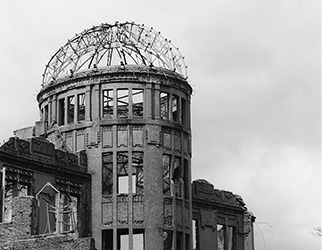
On August 6, 1945, the United States military dropped an atomic bomb on the city of Hiroshima, Japan. Three days later on August 9, an atomic bomb was dropped on Nagasaki, Japan. The bombs directly killed hundreds of thousands of people – largely civilians of all ages – from the initial blast and from injuries and illness in the months following. Many more died from fallout and radiation exposure. Nearly half-a-million survivors (called Hibakusha in Japanese) have lived with ailments, injuries, pain throughout their (often shortened) lives. These attacks on civilian targets with nuclear weapons was of dubious military value and was likely a demonstration of nuclear might for the Soviet Union and the world to see. Hiroshima and Nagasaki are still the only uses of nuclear weapons in wartime and represent crimes against humanity.
Today on the 68th anniversary of this tragic event, we are reminded of the extreme danger and continued threat of nuclear arsenals around the globe. We again call for the total abolition of nuclear weapons.
Toward that goal, we support all efforts at nuclear disarmament and nonproliferation both unilaterally, bilaterally and multilaterally. We call on the U.S. government to live up to its treaty and international obligations in this regard. In 2001, the George W. Bush Administration unilaterally withdrew from the Anti-Ballistic Missile Treaty, pushing the “Doomsday Clock” closer to the midnight of nuclear disaster. Diplomacy and international law are the only ways to resolve global conflicts not nuclear threats.
The U.S. and Russia are the largest nuclear weapons states and we encourage continued bilateral efforts between the two countries to reduce and eliminate their nuclear arsenals. Further testing and plans to “modernize” or replace defunct or outmoded nuclear weapons and weapons systems are a form of proliferation and threaten world peace. The maintenance of nuclear weapons arsenals and capability, far from being a deterrent, exerts a constant pressure for other countries to acquire nuclear weapons as a counter to the nuclear weapons states. Our nuclear arsenals are not defensive, but instead are a key threat that backs up the might of U.S. conventional arsenals and furthers its imperialist aims.
While we support all efforts at nonproliferation and disarmament, nuclear abolition must be the joint goal of all humanity. Any use of nuclear weapons will cause massive humanitarian disaster and possibly a nuclear conflagration that could end life as we know it on the planet.
We call on the U.S. to declare its refusal to use nuclear weapons as a “first-strike” option anywhere. The Obama White House, as previous administrations have done, declared “all options on the table” in various international disputes, meaning the possible first-strike use of nuclear weapons. This contradicts Obama’s pledge to make “concrete steps towards a world without nuclear weapons.” For the U.S. to ever again use nuclear weapons would be criminal, but to reserve the “right” to strike first with nuclear weapons is monstrous. Abandoning first-strike policy would reduce tensions around the world and open the door to possible diplomatic solutions with the countries of North Korea, Iran, etc.
The people of the united State have a special responsibility to play in the struggle for nuclear abolition. Our government is the only one in history to use nuclear weapons in wartime. Nuclear testing in the American Southwest and in the Pacific has had harmful and lasting effects on countless “downwinders” and other victims. Nuclear abolition is not a partisan issue, but one all people should agree on. Even Pres. Ronald Reagan called for the “total elimination” of nuclear weapons.
Hiroshima Day is a dark day for our country and for humanity, but it is a reminder that we can and must prevent nuclear war by permanently eliminating nuclear weapons from the globe.
No more Hibakusha! No more downwinders! No more Hiroshimas! No more Nagasakis!
PHOTO: Genbaku Dome, the only building left standing near the cnter of the bomb impact. Now th Hiroshima Peace Memorial. Wikimedia Commons, public domain.


 Join Now
Join Now